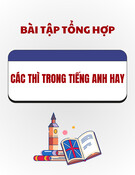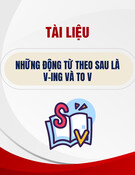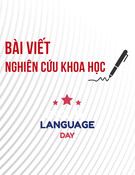
TNU Journal of Science and Technology
229(03): 210 - 218
http://jst.tnu.edu.vn 210 Email: jst@tnu.edu.vn
EXPLORING STRATEGIES USED BY ENGLISH MAJOR STUDENTS
TO OVERCOME CHALLENGES TO IMPROVE LEGAL ENGLISH
VOCABULARY COMPETENCE
Vu Van Tuan*, Nguyen Thi Kim Dung
Hanoi Law University
ARTICLE INFO
ABSTRACT
Received:
18/01/2024
When learning legal English, one of the most challenges to demand
learners' considerable efforts to overcome is its lexical competence. As
being classified as English for specific purposes, legal English has many
distinctive characteristics compared to general English. This study
includes 151 representative legal English major students studying courses
45 and 46 at Hanoi Law University, using a quantitative approach to
explore some typical strategies to enrich their legal English vocabulary.
The results show that the use of archaic words, foreign/borrowed
words, the use of reciprocal words, and the lack of equivalence in
Vietnamese legal terminology are major obstacles that learners
experience. Moreover, the respondents’ viewpoints reveal that the
highest frequency turns to social strategies whereas memory strategies
were used the least. The findings would help school administrators
promulgate legal English innovation policies, teachers reconsider using
relevant pedagogical practices for teaching legal English subjects, and
those interested in improving their legal English proficiency would
confer this paper to better develop their legal English vocabulary.
Revised:
22/3/2024
Published:
22/3/2024
KEYWORDS
Challenges
Legal English
Distinctive characteristics
Lexical competence
Terminology
KHÁM PHÁ NHỮNG CHIẾN LƯỢC SINH VIÊN CHUYÊN NGÀNH TIẾNG ANH
SỬ DỤNG ĐỂ VƯỢT QUA KHÓ KHĂN TRONG VIỆC NÂNG CAO KHẢ NĂNG
TỪ VỰNG TIẾNG ANH PHÁP LÝ
Vũ Văn Tuấn*, Nguyễn Thị Kim Dung
Trường Đại học Luật Hà Nội
THÔNG TIN BÀI BÁO
TÓM TẮT
Ngày nhận bài:
18/01/2024
Học tiếng Anh pháp lý đòi hỏi người học phải rất nỗ lực vượt qua một
trong những trở ngại chính đó là từ vựng chuyên ngành tiếng Anh pháp
lý. Được phân loại là tiếng Anh chuyên ngành, tiếng Anh pháp lý có
những đặc điểm riêng biệt so với tiếng Anh thông thường. Nghiên cứu
này liên quan đến 151 đại diện sinh viên chuyên ngành tiếng Anh pháp lý
đang theo học khóa 45 và 46 tại Trường Đại học Luật Hà Nội. Nghiên
cứu sử dụng phương pháp định lượng để tìm ra chiến lược điển hình của
người học nhằm nâng cao vốn từ vựng tiếng Anh pháp lý. Kết quả cho
thấy việc sử dụng từ cổ, từ nước ngoài/ từ vay mượn, sử dụng từ tương
đương, thuật ngữ pháp luật tiếng Việt thiếu sự tương đương là những trở
ngại đáng kể mà người học gặp phải. Hơn nữa, quan điểm của sinh viên
cho thấy rằng tần suất sử dụng các chiến lược xã giao cao nhất trong khi
các chiến lược trí nhớ được sử dụng ít nhất. Những phát hiện này sẽ giúp
các nhà quản trị trường học ban hành các chính sách đổi mới về đào tạo
tiếng Anh pháp lý, giảng viên cân nhắc điều chỉnh các phương pháp sư
phạm phù hợp để dạy môn tiếng Anh pháp lý và những người quan tâm
đến việc nâng cao trình độ tiếng Anh pháp lý sẽ tham khảo bài viết này
để nâng cao vốn từ vựng tiếng Anh pháp lý.
Ngày hoàn thiện:
22/3/2024
Ngày đăng:
22/3/2024
TỪ KHÓA
Khó khăn
Tiếng Anh pháp lý
Đặc điểm riêng biệt
Khả năng từ vựng
Thuật ngữ
DOI: https://doi.org/10.34238/tnu-jst.9610
* Corresponding author. Email: tuanvv@hlu.edu.vn

TNU Journal of Science and Technology
229(03): 210 - 218
http://jst.tnu.edu.vn 211 Email: jst@tnu.edu.vn
1. Introduction
Legal English, which is so-called legalese and is one kind of English for specific purposes
(ESP), is mostly used by lawyers, judges or written in legal documents, but it is presumably
difficult for lay people to understand [1]. In the era of globalization, legal English characterizes an
important prerequisite for Vietnam to participate in global economic integration. There have been
many studies [2]-[4] in the field of English language teaching and learning (ELT) related to in-
depth understanding of legal English. Shkurat and Gartsunova [5] investigate the legal English
difficulties and ways to overcome the obstacles. They conclude that the poor lexical ability can
cause many difficulties in comprehending legal documents. Similarly, Vu and Tran [3] highlight
the demotivating factors affecting learners in terms of grasping the principal challenges of legal
English of which legal vocabulary greatly influences the learners. Although vocabulary
encompasses active and passive vocabulary, active vocabulary is used frequently in speaking [6]. In
writing legal English, learners must use precise vocabulary to express ideas or opinions and follow
appropriate grammatical structure. Thus, vocabulary competence impacts learners’ writing ability
and quality [7]-[9]. Breeze [10] researches vocabulary teaching in legal documents, particularly a
corpus-driven approach and confirms that vocabulary used in legal documents is grammatically
complex and contains many archaic words. Vocabulary could be more technical, causing
difficulties for the laymen. As reported by Alqahtani [11], vocabulary knowledge significantly
affects students' listening ability and is said to have twice the effect of syntactic knowledge on
second language listening ability [12]. Regarding speaking ability, Dalimunthe and Haryadi [13]
affirm that students' ability to master vocabulary directly affects speaking skills. Regarding reading
skills, many studies [2], [4], [14] indicate that word knowledge helps students develop good reading
comprehension abilities. Vocabulary can be more technical, making it difficult for non-experts. In
Vietnam, research on the forms of learning legal language is still quite new. Nhac [16] points out
the common difficulties of legal English major students in reading and understanding legal English
at Hanoi Law University (HLU). In addition, she also conducted another study on challenges in
learning legal English from legal English major students’ perspectives at HLU [17]. Most
difficulties are possibly due to insufficient vocabulary in specialized English with many different
features, such as the difference in meaning of vocabulary between peculiar English and general
English [18]-[20]. Nevertheless, it is hard to find research addressing the difficulties in learning
legal English vocabulary. Recognizing the difficulty when learning ESP, especially the importance
of mastering legal English vocabulary, the researcher decided to conduct this study with K45 and
K46 legal English major students at Faculty of Legal Foreign Languages at the HLU. In order to get
insight understanding of this theme, the following questions are used as the research orientation:
1. What are the challenges in learning legal English vocabulary that legal English major
students at Hanoi Law University face?
2. How are the strategies for legal English students used to improve their legal English vocabulary?
The study aims to help students understand challenges when learning legal English, and
propose vocabulary learning strategies for students to accumulate appropriate knowledge and a
rational orientation for learning legal English. Furthermore, this study would contribute to
improve the field of English vocabulary teaching and learning, especially the enhancement of
students’ legal English vocabulary.
2. Materials and methods
2.1. Research design
This study employed a cross-sectional examination of 151 representative legal English
students out of 242 legal English major students enrolled K45 and K46 courses at Hanoi Law
University (HLU) via a quantitative approach. Specially, the study utilized a researcher-made
questionnaire to elicit information about the respondents’ attitudes toward challenges they might

TNU Journal of Science and Technology
229(03): 210 - 218
http://jst.tnu.edu.vn 212 Email: jst@tnu.edu.vn
face while learning legal English vocabulary. The research instrument was conducted previously
with a pilot study and retained the statements within the reliable scales (0.84–0.90) [20]. Then,
the collected data from the questionnaire were addressed using the IBM SPSS v.25 application
for the purpose of arriving at a comprehensive conclusion.
2.2. Research instrument and data collection
The research instruments were constructed with two major aspects: challenges in learning
legal English vocabulary and students’ strategies to acquire legal lexical English. The first part
included 13 five-point Likert scale statements asking for the respondents’ self-assessment of
strong disagreement (1), disagreement (2), neutrality (3), agreement (4), strong agreement (5).
The second part consisted of five groups of strategies with 40 statements, namely memorized,
determined, social, cognitive, and metacognitive strategies. The participants were expected to
remark (1) almost never used strategy, (2) rarely used strategy, (3) sometimes used strategy, (4)
frequently used strategy, and (5) always used strategy. The researchers conducted a dry run with
a group of 30 students to test the reliability at first, then the statements within the reliable range
(0.84-0.90) [20] were retained so that the final version was revised for the liability validation.
Having prepared the research instrument properly, the researchers sent an email including an
active Google form to the participant’s email addresses after. The questionnaire also contained
the researcher’s instructions, defined the study’s goals and significance, guaranteed participants’
anonymity, and provided a withdrawal option. The responders were requested to return the
questionnaire within three weeks of receiving the researcher’s email. A phone number was also
offered concurrently in case a respondent had any questions.
2.3. Data analysis
Descriptive statistics were used to gather, tabulate, analyze, and interpret the data. Frequency
count and percentage were employed particularly to address the respondents’ profile. The means and
standard deviations should be interpreted accordingly as follows: strongly disagree/almost never
used strategy (1.0 - 1.80), disagree/seldom used strategy (1.81 - 2.60), neutral/sometimes used
strategy (2.61 - 3.40), agree/frequently used strategy (3.41 - 4.20), and strongly agree/always used
strategy (4.21 - 5.0). Independent Sample T-Test was implemented to hypothesize the difference
between the gender in terms of employing strategies in learning legal English vocabulary.
3. Results and Discussion
3.1. The result of difficulties related to the lexical features
Table 1 indicates legal English major students’ difficulties when learning legal English
vocabulary. Respondents strongly agree that learning archaic words in legal texts causes
challenges for memorizing and using that vocabulary (M = 4.56; SD = 0.584%). Actually,
archaic words, which is possibly so-called such as old-fashioned vocabulary or outdated
linguistic expressions or antiquated language terms, are those that are commonly used in an
earlier time but not commonly used in present-day usage, except in specific contexts such as
religious rituals or historical novels. However, in legal documents, the archaic words are used
frequently, which creates much challenging for all people. This result is shared by other studies
[15], [17], [19] which claim that linguistic characteristics of the legal English language pose
difficulties in learning legal English. The participants genuinely rate that non-equivalent terms in
the Vietnamese legal system significantly impact understanding and learning vocabulary with the
descriptive value as M = 4.49; SD = 0.501%. Non-equivalence in languages refers to the lack of a
direct or exact equivalent between words, phrases, or concepts in different languages due to the
fact that languages have different structures, cultural contexts, and ways of organizing the world.
The learners see it difficult to find appropriate ways to convey meaning across languages. Not
surprisingly, when learning legal English vocabulary, the use of words borrowed from foreign

TNU Journal of Science and Technology
229(03): 210 - 218
http://jst.tnu.edu.vn 213 Email: jst@tnu.edu.vn
languages, especially French and Latin, possibly leads to a high level of influence (M = 4.47; SD
= 0.514%). Legal texts commonly contain many French and Latin words due to historical reasons,
such as the Norman Conquest, and the linguistic precision, formality, and tradition associated with
these languages. This poses many challenges for novice language learners who have to spend
much time looking up the meaning of those words. These words are sometimes derived from
locality, which is only understood by language experts. This finding is consistent with other
studies [3], [10], [13] as well. The following two ranks with relatively high agreement among the
students that cause difficulty when learning vocabulary are the use of synonyms in legal
terminology (M = 4.39; SD = 0.622%) and using reciprocal words (M = 4.31; SD = 0.518%),
these two items altogether result in much confusion in using legal English vocabulary in the
proper context. The students agree that doublets or triplets expressing a legal concept cause
difficulty comprehending vocabulary (M = 3.70; SD = 0.617%). Two items with the same ranking
are the use of technical terms in legal documents (M = 3.25; SD = 0.778%) and the use of
polysemy words with different meanings between general English and legal English also
somewhat affects the ability of specialized English students to learn vocabulary (M = 3.25; SD =
0.912%). Besides, items such as using unfamiliar pro-forms (M = 3.24; SD = 0.808%), use of
phrasal verbs in a quasi-technical sense (M = 3.21; SD = 0.823%), and degree of formality in word
choice (M = 3.10; SD = 0.758%) are anyway not considered as a major problem for the students
when learning legal English vocabulary. Lastly, two items with a reasonably low mean value that
students think as not to present many problems when learning vocabulary are the use of legal
neologism with a mean value of 2.98; the standard deviation of 0.927%, and the use of
circumlocutions with a mean value of 2.73; SD = 0.846%. As a whole, most students participating
in the survey claim that factors related to legal terminology raise great challenges in acquiring
legal English vocabulary. In learning English vocabulary in general and legal English in particular,
the biggest challenges that the learners encounter are choosing the appropriate meaning of words
based on context, the finding is in line with the research results done by [11], [14], [16].
Table 1. Learners’ difficulties in learning legal English vocabulary
Statement
n
Mean
Std.
Deviation
Description
Degree of formality in word choice
151
3.10
0.758
Neutral
Use of doublets and triplets conveying single legal concepts
151
3.70
0.617
Agree
Use of technical terminology
151
3.25
0.778
Neutral
Use of synonymy in legal terminology
151
4.39
0.622
Strongly agree
Use of polysemy in legal terminology
151
3.25
0.912
Neutral
Use of legal neologism
151
2.98
0.927
Neutral
Use of archaic expressions
151
4.56
0.584
Strongly agree
Use of foreign words/Maxim borrowing from Latin or French origin
151
4.47
0.514
Strongly agree
Use of phrasal verb in a quasi-technical sense
151
3.21
0.823
Neutral
Problems of non-equivalent meaning in Vietnamese legal terms
151
4.49
0.501
Strongly agree
Use of unfamiliar pro-forms
151
3.24
0.808
Neutral
Use of reciprocal words
151
4.31
0.518
Strongly agree
Use of circumlocutions
151
2.73
0.846
Neutral
Valid N (listwise)
151
3.2. The analysis of the students’ vocabulary learning strategies for learning legal English
3.2.1. The analysis of social strategies
Regarding social strategies, the students suppose that asking teachers to translate new words
into Vietnamese was a frequently used strategy (M = 3.94; SD = 0.768%). As this is the core
nature of social strategies in which the learners seek for help from other individuals within their
learner’s society. In other words, the role of mother tongue (L1) is utilized to enhance learners’
understanding of its meaning. This finding is greatly in line with some recent studies [1], [7],

TNU Journal of Science and Technology
229(03): 210 - 218
http://jst.tnu.edu.vn 214 Email: jst@tnu.edu.vn
[19]. Besides, the respondents sometimes communicate with instructors in English to use new
lexical terms to improve vocabulary knowledge (M = 3.26; SD = 0.737%). This date indicate that
the students have to develop their skills of guessing words in context. This confirmation is also
found in other studies such as [10], [13], [19]. The students subjectively assert that the strategy of
communicating with their teachers in English to ask for synonyms of a new word or explain the
word is the highest mean value (M = 4.17; SD = 0.838%), and it is the strategy used frequently
by the learners, followed by using the Internet to look for information in English about that new
vocabulary item (M = 4.16; SD = 0.677%). The students believe that discussing in English with
classmates to know and expand their understanding of the meaning of a new vocabulary word is
sometimes utilized (M = 2.96; SD = 0.738%). The least used strategy under the social strategies
was communicating with foreigners employing different types of media to develop new
vocabulary (M = 1.71; SD = 0.558%). The remaining two strategies are exploiting English games
such as scrabble and crosswords to find the meaning of new words through group activities (M =
4.02; SD = 0.875%) and learning and practicing the meaning of new words in groups to expand
vocabulary knowledge (M = 3.41; SD = 0.557%) are strategies which are regularly used. As
such, the teacher plays a central role in providing information about vocabulary, the learners can
spend less time learning the meaning of new words, and the students just follow the instructors’
direction, which is partially in line with Vu [17]. Thus, this strategy indicates that teachers and
classmates participate in explaining and using new legal lexical words on the purpose of
comprehending the words’ meanings.
3.2.2. The analysis of determination strategies
As shown in Table 2, the most used strategy is the use of an English-Vietnamese dictionary (M
= 3.88; SD = 0.796%), then using English-English dictionaries (M = 3.58; SD = 0.724%),
Vietnamese-English dictionaries (M = 3.52; SD = 0.575%). Guessing the meaning of words
through word structure such as parts of speech has the second highest points in the determination
strategies with a mean value of 3.75; SD = 0.693%. Besides, analyzing the structure of words
(prefixes, roots, and suffixes) to find the meaning of words is also occasionally used. Meanwhile,
guessing the meaning of words based on context (M = 2.40; SD = 0.674%), the grammatical
structure of the sentence (M = 1.89; SD = 0.713%), and aural features such as stress, intonation,
and pronunciation (M = 1.84; SD = 0.814%) were used less frequently than other strategies. These
figures denote that legal English major students at HLU commonly use bilingual dictionaries to
discover the meaning of vocabulary. This finding is in proportion to one another study [2], its
researcher affirms that using bilingual dictionaries is suitable for high-level learners, especially
legal English major students. Thus, under the determination strategies, the students do not prefer
analyzing the characteristics of words to search for the meaning of words through the dictionary. It
seems that the learners’ autonomy through some activities such as guessing the meaning of words
through context, aural features, and grammatical structures has not been promoted [5].
3.2.3. The analysis of metacognitive strategies
Table 2 states that the students’ preference for watching English-speaking movies with
subtitles while learning vocabulary scored the highest value (M = 4.72; SD = 0.460%). Similarly,
testing vocabulary with word lists effectively expands learners’ vocabulary also gained second
utmost use (M = 4.55; SD = 0.499%). Additionally, to enrich vocabulary, the learners research and
do additional exercises from various sources such as articles and texts (M = 4.43; SD = 0.526%).
Using some articles from other sources, such as magazines, newspapers, or brochures is also
preferred by the students (M = 4.38; SD = 0.609%). Surprisingly, the findings show that the legal
English major students almost never use two strategies, particularly picking up new words by
listening to English radio programs and studying vocabulary from advertisements, written signs,
and written notices (M = 1.53; M = 1.41, respectively). In reality, metacognitive strategies involve












![Bài tập thì hiện tại hoàn thành [kèm đáp án chi tiết]](https://cdn.tailieu.vn/images/document/thumbnail/2025/20251106/thuthao27062004/135x160/41601762420911.jpg)






![Tài liệu ôn tập Ngữ pháp tiếng Anh [chuẩn/mới nhất/tổng hợp]](https://cdn.tailieu.vn/images/document/thumbnail/2025/20250821/vuongdinhlinh1412@gmail.com/135x160/933_tai-lieu-on-tap-ngu-phap-tieng-anh.jpg)




